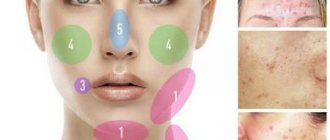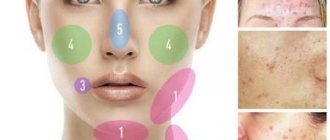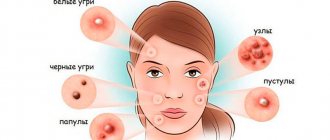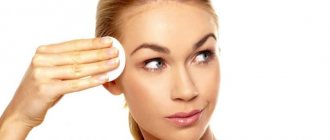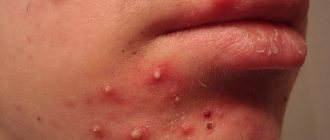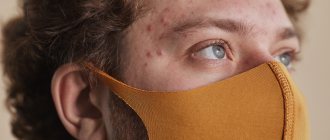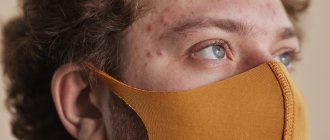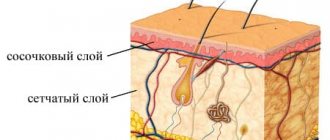Pimples* on the face: causes of occurrence in women104
Women's health and skin condition largely depend on hormonal levels. The male hormone testosterone is responsible for the processes that occur in the epidermis. In women, it is produced by the adrenal glands and ovaries.
With increased secretion of androgens, the sebaceous glands begin to produce too much sebum. Gradually it mixes with particles of dirt, dead cells, cosmetics and undergoes oxidation under the influence of oxygen. This is how open comedones are formed.
Hypersensitivity to steroid hormones in women over 30 years of age is one of the main causes of acne. An increase in androgen activity disrupts the water-lipid balance and causes clogged pores. Gradually, against the background of a slowdown in the process of sebum removal, bacteria begin to multiply in the sebaceous glands, and foci of inflammation appear on the skin.
An active increase in the level of androgens and the tendency to form acne is especially pronounced in the second phase of the menstrual cycle. Before the onset of menstruation, the level of steroid hormones in the body sharply increases, which activate comedogenic processes.
What causes acne
The causes of acne are varied , and it is not always possible to identify only one of them. Dermatologists identify two groups of mechanisms that trigger this process. The first includes physiological conditions, and the second includes diseases whose symptoms are acne. We are talking about several factors that have to be worked on comprehensively.
Physiological reasons
Rashes may appear on a woman’s face, the causes of which are not related to diseases . The situation cannot always be changed, but it does not pose a threat to health. This group includes the following factors:
- Hormonal changes. Fluctuations in hormonal levels are observed during menstruation, during breastfeeding and pregnancy, and during puberty. In this case, persistent acne in women on the chin, cheeks and cheekbones is transient and goes away on its own after normalization of the glands.
- Poor skin cleansing. Clogging of the sebaceous glands with dirt or cosmetics leads to suppuration and inflammation of the contents.
- Poor nutrition. Cakes, fast food, buns and sweets spoil not only your hips and waist, but also your face. A high sugar content is a favorable background for the development of microflora that lives on the skin. By feeding bacteria with sugar, you provoke their activity.
- Unhealthy Lifestyle. Alcohol and nicotine are poisons that poison the body. Human skin is involved in the elimination of toxins, which is why it reacts with the appearance of acne.
- Medicines. Taking various drugs kills normal microflora, which causes bacteria that are resistant to antibiotics to multiply. Acne can be triggered by taking anabolic hormones or hormonal contraceptives.
- Genetic predisposition. Oily and dense skin inherited from parents has virtually no chance of avoiding acne. Genetic medicine has not yet reached the point of treating acne, so we can only rely on local cosmetic products and methods.
READ ALSO: Causes of acne on the face in women after 30 - Skin care
Pathological causes
Sometimes the causes of acne are quite serious diseases that require diagnosis and treatment.
- Violation of hormone production. Pimples can signal diseases of the endocrine system, pathology of the adrenal glands, gonads or pituitary gland. If, in addition to the rash, you are concerned about menstruation irregularities, facial hair growth, blood pressure fluctuations, or the inability to get pregnant, then make an appointment with a doctor to diagnose the pathology.
- Diseases of the gastrointestinal tract. Duodenitis, gastritis, pancreatitis, chronic constipation, irritable bowel syndrome, and intestinal dysbiosis lead to the appearance of acne. The process of food digestion is disrupted, toxins accumulate, causing inflammatory reactions. If you are worried about acne on the neck and cheekbones, you should look for causes in the gastrointestinal tract with the following symptoms: heartburn, nausea, bowel dysfunction in the form of constipation or diarrhea, pain in the intestines, bloating.
- Disease of the hepatobiliary system. The liver is the body's main detoxifier, responsible for removing toxins from the blood and filtering it. Liver dysfunction develops with steatohepatosis, hepatitis, and delayed bile drainage, which are associated with gallbladder diseases. If you notice heaviness and pain in the right hypochondrium associated with physical activity or food, get examined.
- Demodecosis. A tiny mite that lives in the epidermis can be the culprit for the fact that acne on the cheekbones and cheeks does not want to go away. It clogs the ducts of the sebaceous glands and serves as a powerful allergen that causes inflammation. If there is more redness and swelling on the face than suppuration, consult a dermatologist.
- Allergy. Acne can occur due to food intolerances. Food allergens can be nuts, milk, berries, honey or citrus fruits. Try eliminating these foods from your diet for a couple of weeks and watch your skin. If the number of acne has decreased, add one product to the menu and figure out the culprit.
- Nervous system disorder. First of all, we are talking about chronic or acute stress. At the same time, the hormone cortisol increases in the body, which causes vasoconstriction, as a result of which facial tissues receive few nutrients. Decreased immunity plays a big role, because it accompanies depression, chronic stress and bipolar disorder.
The skin has many reasons to look imperfect, and your task is to find out the reason for this and eliminate it. And the entire arsenal of medicine, home care methods and cosmetology will come to the rescue.
READ ALSO: Pimple on the labia: photo, why it popped up and what to do?
Why do women get acne* on their faces? 104
In adult women, acne is often associated with hormonal diseases of the reproductive system (mastopathy, polycystic ovary syndrome, fibroids, etc.). In some cases, acne is the first indication of the presence of hyperandrogenism. If you have acne on your face, it is important to determine the true reasons for its formation. The fact is that every disease that causes rashes requires specialized, often complex, treatment.
In modern medicine and cosmetology, a number of hormonal factors are identified that lead to the formation of late acne in women:
- Changes in hormonal levels before menstruation. An increase in progesterone levels activates the secretion of sebum, which in turn provokes the formation of premenstrual acne.
- Reception OK. Oral contraceptives contain substances that change the course of the natural processes of hormone production in the female body. In some cases, during use or at the stage of discontinuation of OCs, sebum production is activated, which leads to the formation of acne.
- Endocrine diseases. Dysfunction of the adrenal cortex, pathologies of the pituitary gland and other pathologies of the endocrine system cause excessive acne formation in some women.
- Gynecological diseases. Pathologies of the reproductive system are often a provoking factor in the development of acne in women. In particular, in many patients aged 30-40 years, the appearance of acne is associated with polycystic ovary syndrome.
- Pregnancy. During pregnancy, a woman's body undergoes active hormonal changes, so the appearance of acne during this period is absolutely normal. Especially in the first trimester.
- Menopausal syndrome. Usually observed during the decline of childbearing functions. It is caused by a gradual decrease in the size of the ovaries and uterus, the disappearance of menstrual bleeding. Hormonal changes that occur in the body during menopause often provoke excessive sebum secretion and, as a result, acne.
Diagnostic methods
Even doctors cannot independently exclude or confirm serious diseases without involving specialists or research. If you notice any of the symptoms mentioned above, go to a specialist. If no clear symptoms are observed, proceed sequentially:
- Visit a gastroenterologist. The doctor will check the symptoms and prescribe tests, if necessary: ultrasound of the liver, pancreas and biliary tract, blood test.
- After questioning, the endocrinologist will recommend undergoing an ultrasound of the pelvic organs and adrenal glands, and donating blood for hormonal levels.
- Psychiatrist. Contacting this specialist frightens many patients, because in their imagination they conjure up images of institutions with bars and a straitjacket. Such stereotypes have no relation to modern psychiatry, so do not be afraid to see a psychiatrist to identify abnormalities in the functioning of the nervous system.
- It’s not for nothing that a dermatologist is in last place on the list of visits to doctors, because he can start working only when other doctors have ruled out pathologies of his own profile. You will be required to submit a scraping of the epidermis, a clinical allergy test and blood test.
If abnormalities are detected, you will be prescribed appropriate treatment that will eliminate acne and the causes of its appearance. Follow all doctor's recommendations, even those related to nutrition and lifestyle.
What to do if acne occurs?
To get rid of acne, you must first determine the true causes of the pathology. Before performing cosmetic procedures, experts advise visiting a dermatologist, endocrinologist, gastroenterologist and, of course, a gynecologist. Treatment of acne caused by gynecological or endocrine diseases includes eliminating the primary causes of the rash.
To help the body cope with acne faster, cosmetologists recommend reviewing your diet. Changing gastronomic habits (giving up sweets, flour, spicy, salty, etc.) can have a positive effect on the condition of the face.
How to fight acne on your own
When acne appears on a woman's cheekbones, it is not always possible to identify the causes. Doctors are confident that you are healthy, but the condition of your skin leaves much to be desired. And most likely, we are talking about eating or lifestyle disorders, as well as hereditary predisposition. Start fighting pimples on your own.
Local remedies
It will not be possible to do without local treatment; your actions should be aimed at cleansing, disinfecting and drying the skin:
- Choose products with an antiseptic effect for washing. Choose gels that contain salicylic acid.
- Rinse your face with a mixture of adding a tablespoon of lemon juice or apple cider vinegar to a glass of water.
- Wipe your face daily with a cotton pad soaked in salicylic alcohol.
- To rinse your face, prepare a decoction or infusion of string, chamomile, sage or oak bark. You will need one tablespoon of plant material per glass of water. Freeze the healing decoction in the form of ice cubes and wipe your face with them in the morning.
- A pimple located deeply can take a long time to mature, causing very unpleasant and painful sensations. Cotton wool with Vishnevsky ointment will help to pull it out, which should be secured with a band-aid overnight.
READ ALSO: How to get rid of acne on your face, Health and Living Healthy with Elena Malysheva
Tar soap is an effective cleanser. It dries and disinfects the skin perfectly, but has an unpleasant, pungent odor. Hide the bar in a closed soap dish.
Acne on the face: causes and treatment
There are many reasons for the occurrence of acne: the use of cosmetics with comedogenic ingredients, stress, genetic predisposition, taking medications (for example, anabolic steroids), gastrointestinal pathologies, etc.31,49,80. When prescribing treatment, the dermatologist also takes into account why the rash appeared. In the treatment of mild to moderate acne, azelaic acid, for example, Azelik®5,9, can be used. The drug is used twice a day5. It is applied to clean, dry skin5.
*acne

